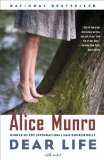Summary | Excerpt | Reading Guide | Reviews | Beyond the Book | Readalikes | Genres & Themes | Author Bio

Stories
by Alice Munro
"Well that's very nice," he said, and started to back out.
On Lions Gate Bridge he said, "Excuse me for sounding how I did. I was thinking whether I would or wouldn't kiss you and I decided I wouldn't."
She thought he was saying that there was something about her that didn't quite measure up to being kissed. The mortification was like being slapped clean back into sobriety.
"Now when we get over the bridge do we go right on Marine Drive?" he continued. "I'll rely on you to tell me."
During the coming fall and winter and spring there was hardly a day when she didn't think of him. It was like having the very same dream the minute you fell asleep. She would lean her head against the back pillow of the sofa, thinking that she lay in his arms. You would not think that she'd remember his face but it would spring up in detail, the face of a creased and rather tired-looking, satirical, indoor sort of man. Nor was his body lacking, it was presented as reasonably worn but competent, and uniquely desirable.
She nearly wept with longing. Yet all this fantasy disappeared, went into hibernation when Peter came home. Daily affections sprang to the fore then, reliable as ever.
The dream was in fact a lot like the Vancouver weather—a dismal sort of longing, a rainy dreamy sadness, a weight that shifted round the heart.
So what about the rejection of kissing, that might seem an ungallant blow?
She simply cancelled it out. Forgot about it entirely. And what about her poetry? Not a line, not a word. Not a hint that she had ever cared for it.
Of course she gave these fits houseroom mostly when Katy was napping. Sometimes she spoke his name out loud, she embraced idiocy. This followed by a scorching shame in which she despised herself. Idiocy indeed. Idiot.
Then a jolt came, the prospect then certainty of the job at Lund, the offer of the house in Toronto. A clear break in the
weather, an access of boldness.
She found herself writing a letter. It didn't begin in any conventional way. No Dear Harris. No Remember me.
Writing this letter is like putting a note in a bottle—
And hoping
It will reach Japan.
Nearest thing to a poem in some time.
She had no idea of an address. She was bold and foolish enough to phone the people who had given the party. But when the woman answered her mouth went dry and felt as big as a tundra and she had to hang up. Then she carted Katy over to the public library and found a Toronto phone book. There were lots of Bennetts but not a single Harris or H. Bennett.
She had a shocking idea then, to look in the obituaries. She couldn't stop herself. She waited till the man reading the library copy was finished. She did not see the Toronto paper usually because you had to go over the bridge to get it, and Peter always brought home the Vancouver Sun. Rustling through its pages fi nally she found his name at the top of a column. So he was not dead. A newspaper columnist. Naturally he would not want to be bothered with people calling him by name, at home.
He wrote about politics. His writing seemed intelligent but she did not care anything about it.
She sent her letter to him there, at the newspaper. She could not be sure that he opened his own mail and she thought that putting Private on the envelope was asking for trouble, so she wrote only the day of her arrival and the time of the train, after the bit about the bottle. No name. She thought that whoever opened the envelope might think of an elderly relative given to whimsical turns of phrase. Nothing to implicate him, even supposing such peculiar mail did get sent home and his wife opened it, being now out of the hospital.
Katy had evidently not understood that Peter's being outside on the platform meant that he would not be travelling with them. When they began to move and he didn't, and when with gathering speed they left him altogether behind, she took the desertion hard. But she settled down in a while, telling Greta that he would be there in the morning.
Excerpted from Dear Life by Alice Munro. Copyright © 2012 by Alice Munro. Excerpted by permission of Knopf, a division of Random House, Inc. All rights reserved. No part of this excerpt may be reproduced or reprinted without permission in writing from the publisher.




A book is one of the most patient of all man's inventions.
Click Here to find out who said this, as well as discovering other famous literary quotes!
Your guide toexceptional books
BookBrowse seeks out and recommends the best in contemporary fiction and nonfiction—books that not only engage and entertain but also deepen our understanding of ourselves and the world around us.